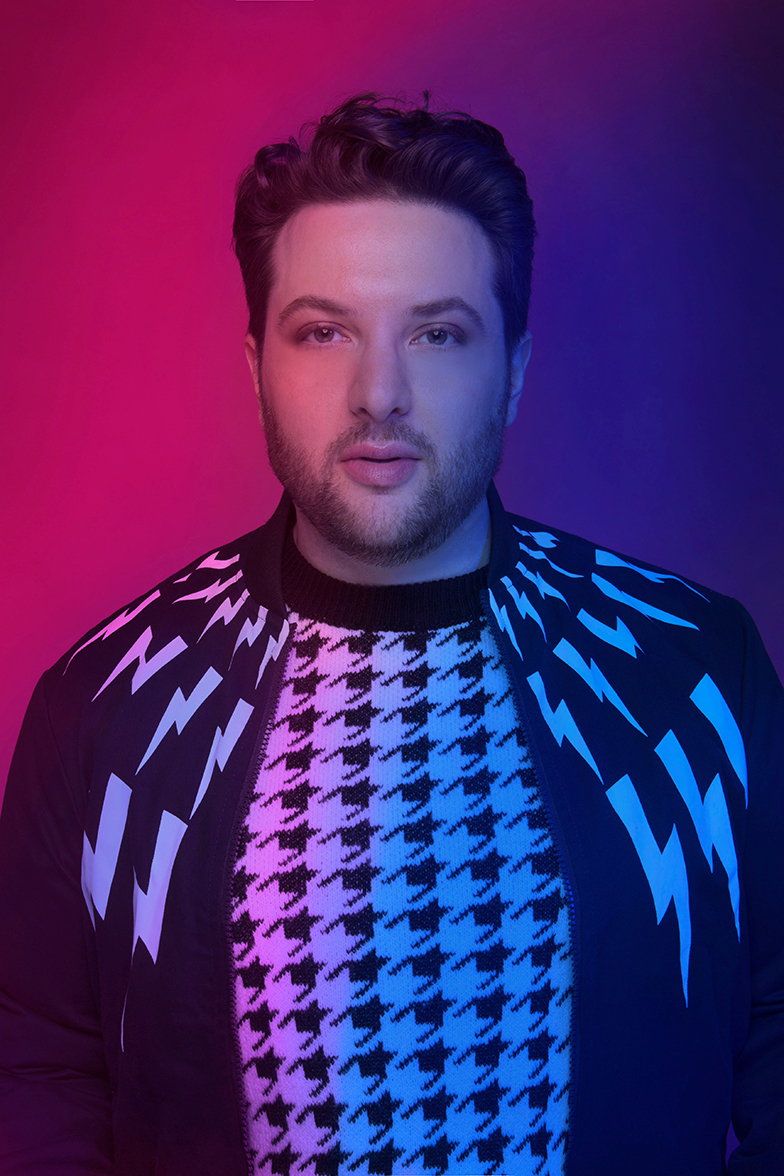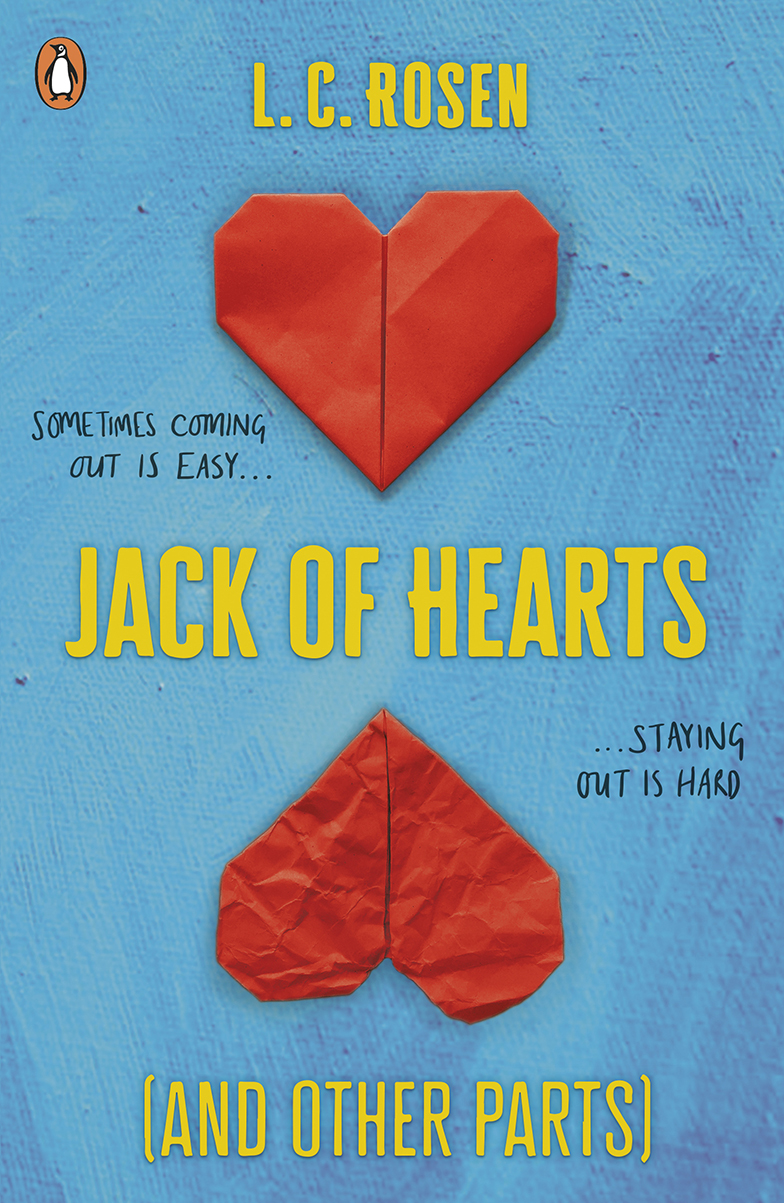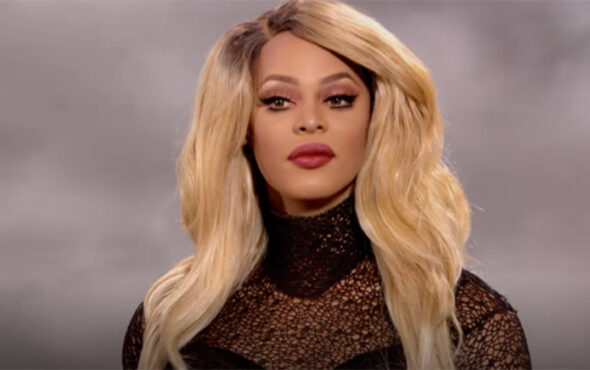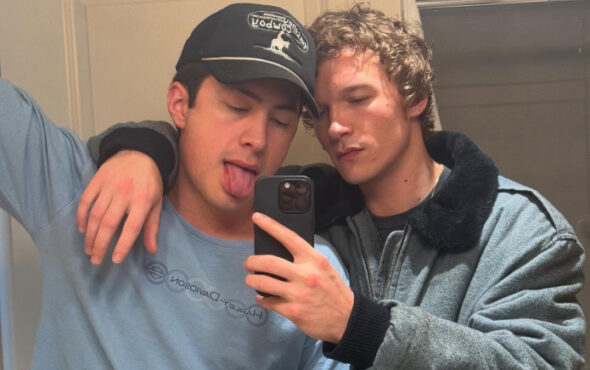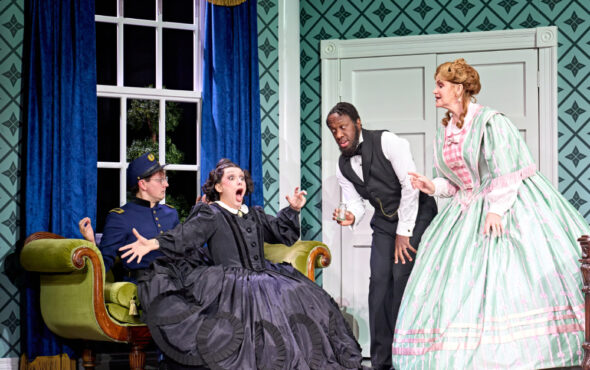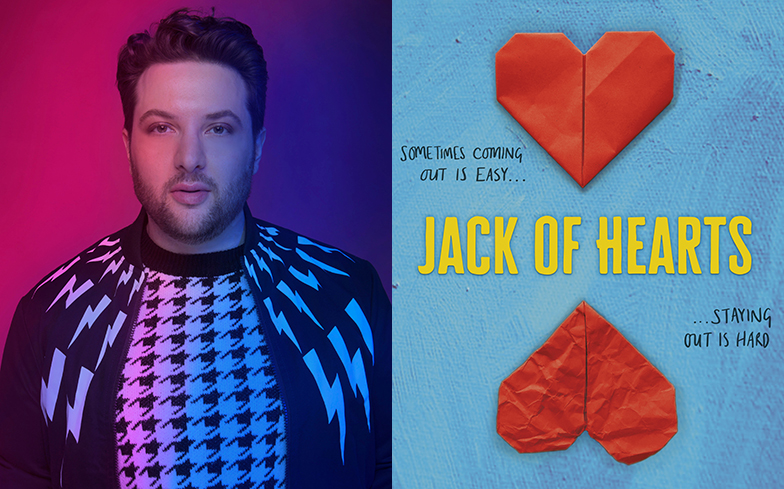
Jack of Hearts might be the most important queer novel of the decade.
LGBTQ narratives are slowly working their way into mainstream entertainment, but with this progress comes concern that our stories are being watered down in order to appeal to a heteronormative society. That’s why Jack of Hearts, the new novel from L. C. Rosen that’s both filthy and heartwarming at the same time, feels like such a major moment.
Jack is gay. He wears makeup and tight clothes. He has lots of sex (or at least that’s what the rumours say), and he writes an advice column for his best friend’s blog addressing everything from unfortunate anal experiences to BDSM. If the premise sounds similar to Netflix’s wildly popular new series Sex Education, that’s because it kind of is, only this story is far more queer, and perhaps more outrageous – if that’s even possible.
“I like to say that it’s not a coming out story, it’s a staying out story,” says author Rosen of his novel. Tired of books that treat queer characters with a “just like you” mentality, he set about writing Jack of Hearts, a part-novel part-sex education tool that explores what it means to be queer beyond the act of coming out.
We spoke to Rosen about the importance of queer-inclusive education in schools, discussing blowjob techniques with men in their 60s, and why LGBTQ teens need to fight back against the glass closet.
Where did you get your inspiration for the book?
The main thing that inspired me was the fact that young adult books tend to depict gay men in one of three ways, which is either a sweet romantic comedy, and that’s important because we need to see young gay men being able to fall in love; a story where their queerness is incidental, meaning if you switched a character’s gender the plot would not have changed at all, which is also important because we need to see young gay men being able to do things with no regard to their sexuality; and the final type is the coming out novel, and that was the only one to me that felt like a book specifically about queerness. But there’s more to that story, it’s not just the coming out narrative over and over again. I knew that I wanted to write something that was about queerness in many different ways, so from there I was like, ‘Alright, let’s focus on what queerness is about: it’s about sex’. And as I was writing it, I was thinking about how they don’t teach queer sex education in schools, and that was the moment I realised, ‘Oh, I know what this book is now’.
How closely Jack’s experience mirror your own experience of adolescence?
Well, I went to a private high school in New York City, and that definitely inspired Jack’s school environment, but other than that there’s really not that much in common. In terms of my own personal experiences, I don’t talk about those, but I was a good student, I didn’t wear a lot of makeup. Jack is a bad kid in the way that society thinks of bad kids, but really he’s a great kid. In that sense I wasn’t that similar. Although I was sort of a goth kid.
Did you face any resistance when trying to get Jack of Hearts published? Because it is quite unexpected for a YA book to be so explicit and open about queer sex…
I know, right? So the publishing process was quite non-traditional. I wrote 99 pages of this very quickly in about a week or two, and I was like, ‘This might be the worst fucking idea I’ve ever come up with’. I’m friends with some editors because I have previous books, and one of the editors who published one of my middle grade novels is a good friend, so I was like, ‘Look, I wrote this thing, and it may be my worst idea ever, but I would appreciate it if you could read it and tell me if I should just give up on it now’, because I have a rule where if I write 100 pages then I have to finish the book. So she read it and she was like, ‘Just submit this to me professionally, like just do it right now’. So we did, and that was it. We didn’t show it to anyone else, and she immediately made an offer. I was shocked. It worked out really well. I suspect if I’d gone the more traditional route, I would have subdued the explicitness a lot more, if only because I know my agent worries about getting people to approve of things, and certainly I would start thinking more about everyone else. But this non-traditional method of just asking, ‘Is this even worth it?’ worked out really well.
Was there anything in the book that you felt was too much to put in there?
I was always ready for my editor to say, ‘OK, you’ve gone too far’, so I always had backups ready, especially for those letters! There’s one later one which is essentially, ‘How to do BDSM’. With that one I was like, ‘Alright, she’s definitely going to say no to this’, but I felt like I should push as far as I could and see what they let me do, and they didn’t have a problem with anything, much to my shock. I think that’s great! But yeah, I was always prepared for that. I still have some of the backup letters in my computer, with the answers written out.
Do you worry that queer stories are being sanitised and desexualised to make them appeal to a mainstream audience?
Oh absolutely. I think that there are a few things at play here, and the main one is that in our cis-hetero, patriarchal, white-supremacist society all forms of queerness are seen as inherently sexualised. Straightness is the norm, and therefore if a 12-year-old boy has a girlfriend, people can look at it and think it’s cute, but if they see two 12-year-old boys in a relationship, they’re like, ‘OK, they’re probably having sex because they’re gay’, and that obviously is a huge problem. That results in a lot of stories about queer teens and queer youth being desexualised, because the queerness alone is already sexualised in the eyes of this cis-hetero society we live in. If you go even further than that and say, ‘Yes, these gay teenagers do have sex’, then it becomes borderline pornographic in the eyes of many adults, and that is an unfair double standard. I’m hoping that kind of bullshit will eventually fade away. But in the meantime, it creates this uncomfortable situation for a lot of queer teenagers where they essentially don’t know what their sex life should look like. They have no representation to turn to except for pornography, and that’s fine as a fantasy – as long as it’s made consensually – but it’s not a basis for a healthy relationship or what realistic sex is like. It creates weird expectations, it screws with these kids’ minds, and it’s easily accessible so of course they’re turning to it. That’s an issue. We need to make sure that in terms of television and movies and books about teenagers, queer sexuality is depicted as explicitly as their straight counterparts.
When you were writing this book, were you specifically writing it for an LGBTQ audience, or was it for everyone?
I think generally when you’re writing a book, your first audience is always yourself, and obviously I’m queer. I was not writing it with a straight audience in mind, in the sense that I was trying to explain queerness to straight people, I did not give a fuck about that. Us queer people grow up reading every straight book under the sun, and I can guarantee you none of those authors are worried about explaining straightness to queer people. I do remember going back over the first draft and thinking, ‘Alright, this is definitely for queer people, but I’m hoping straight people will read it too, what are they going to get out of it?’ So in that sense it became kind of informative. It’s definitely for gay people, but it’s not like I forgot that straight people exist.
The book is obviously a very funny read, but were there any serious messages you wanted to get across?
So the thing I really wanted to talk about was the glass closet, this idea that you can come out and there are these wonderful liberal people who will be like, ‘Oh my god, you’re out, I love you, it doesn’t change anything’, but then the moment you step outside of this glass closet, this idea of what a ‘good gay’ should be like, then all of a sudden it’s like, ‘Do you have to be so in-your-face about it?’ Anyone like that who claims to be very liberal and supportive, they still want to socialise you in a very specific way, they still want you to behave in a specific way. The moment you step outside those boundaries, which usually involves gender non-conformity, that’s when all-of-a-sudden society’s going to be like, ‘No, that’s not how you’re supposed to behave’. I want teenagers to be able to feel like they can smash that glass closet, essentially, because those standards are bullshit.
What are some of the best responses you’ve had to the book so far?
Well, I had a great email from a gentleman in his 60s with questions about blowjob techniques. That was delightful. I posted it on my Instagram. I have had a lot of positive reviews and people saying how important they feel the book is, and it was on the LA Top 10 Rainbow Book List, so generally responses have been very positive. But I haven’t had a single email from a teenager yet, as far as I know. I’ve had a lot of men in their 20s and 30s saying, ‘Oh my god, thank you for this book, I feel like I needed this’, but no teenagers, and I get that, because writing to an adult about this sexual book and being like, ‘Thank you so much for teaching me about sex’, that is an awkward email and honestly I don’t wanna get that email because then the FBI might have questions. So I am fine with that.
One of the biggest arguments against LGBTQ-inclusive sex education at schools that pops up a lot is that children are too young to understand, or that they shouldn’t be exposed to it until they’re older. What would you say to people who think that?
Any sex education that is addressing STDs and pregnancy without at least equally emphasising pleasure and consent is causing a lot of the more obvious problems in the world right now. The idea that there are 12-year-olds seeing adverts for the 50 Shades of Grey movies just thinking it’s like an innocent movie, that level of naivety on the part of adults is astounding to me. Kids reading about or seeing sex isn’t going to make them have sex, that’s a ridiculous idea, and certainly hearing that gay people have sex isn’t going to make them gay. But if it’s done correctly, it is going to teach them about consent, about pleasure, about giving them the tools they need to go into their first sexual situation – whenever that may be, maybe after marriage, maybe during college, whenever is right for them – and feel as though they at least have a general idea of what’s about to happen. It’s not some great terrifying mystery. Also teaching kids as much as possible about knowing what they’re into – and being ok with that – is also going to help them feel less isolated, because kids who are like, ‘Oh god, I’m into this thing and it’s weird, that makes me a freak, I can never have sex with anyone’, that’s not good either. There are so many ways that we’re screwing up kids about sex. So I would say to anyone who has that mentality, ‘Congratulations, you’re giving a lot of kids complexes’.
What impact do you hope the book will have on the world?
That’s a little scary! I’m hoping more teenagers – and apparently 20, 30, and 60-year-olds as well – become more comfortable not only with their sexuality, but with their presentation of their sexuality, with their desires, and that they feel comfortable asking for the things that they want when it comes to sex, and saying no to the things they don’t want. I think that would be the greatest takeaway. It would be great if a lot of straight people read the book and came away from it with an understanding of the way they enforce this heteronormative world on queer people, and the way they fetishise gay men and make them into these cute objects – which is something you see a lot with straight women. We talk a lot about how when straight men watch lesbian porn, lesbians find it very creepy, but when straight women read all these gay romances, a lot of gay men find that creepy too. It’s the same sort of fetishisation. I’m not saying straight men can’t jerk off to lesbian porn or whatever, but the moment you start seeing all lesbians as sex objects for your pleasure, thats an issue, and the same is definitely said about straight women who read these gay romance novels and then expect all gay men’s relationships to somehow be performative for them. It’s creepy and fetishising. So that’s what I hope straight people take away from the book.
Jack of Hearts (And Other Parts) by L.C. Rosen is out now.
